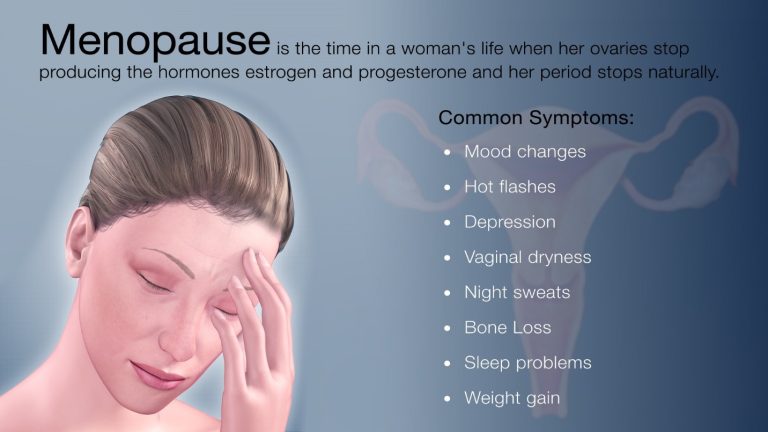Menopause is a natural phase in a woman’s life that typically occurs between 45 and 55. It marks the end of a woman’s reproductive years and can bring about a variety of physical and emotional changes. While every woman’s experience with menopause is unique, there are several common menopause symptoms that many women encounter. In this article, we will explore these common symptoms, shedding light on what causes them and how to manage them effectively.
Hot Flashes And Night Sweats
Hot flashes and night sweats are perhaps the most widely recognized menopause symptoms. They are characterized by a sudden and intense feeling of heat, often accompanied by redness and sweating. Hot flashes can strike any time, even during sleep, leading to night sweats. These symptoms are primarily caused by hormonal fluctuations during menopause, specifically a decrease in estrogen levels.
Managing hot flashes and night sweats can be challenging, but there are various strategies to consider. Many women find relief by dressing in layers, using cooling products like fans or cool clothes, and avoiding triggers like spicy foods, caffeine, and alcohol. In some cases, hormone therapy or non-hormonal medications may be prescribed by a healthcare provider.
Irregular Menstrual Cycles
As a woman enters menopause, her menstrual cycles typically become irregular. This means the interval between periods can vary, and the flow may be heavier or lighter than usual. Eventually, menstruation stops altogether, marking the official onset of menopause. These irregular cycles are due to the fluctuating hormone levels, particularly estrogen and progesterone.
While irregular periods are a normal part of menopause, it’s essential to keep track of them to monitor any unusual changes. Consulting with a healthcare provider can help ensure that these irregularities are related to menopause and not indicative of other underlying health issues.
Vaginal Dryness And Changes In Sexuality
Another common menopause symptoms is vaginal dryness, which can result in discomfort during sexual intercourse. The decrease in estrogen levels leads to thinning and drying of the vaginal walls, making sex less pleasurable for many women. Additionally, the hormonal changes can affect a woman’s libido, leading to changes in her sexuality.
To manage vaginal dryness, various treatments are available, including over-the-counter lubricants and moisturizers, as well as prescription medications like vaginal estrogen. Open communication with a partner and exploring different sexual techniques can also help maintain intimacy and fulfilling sex life during this phase.
Mood Swings And Emotional Changes
Menopause can bring about mood swings, anxiety, and even depression in some women. These emotional changes are often linked to hormonal fluctuations. Still, they can also be influenced by external factors, such as life transitions, stress, and a sense of loss associated with the end of fertility.
To manage mood swings and emotional changes, it’s crucial to maintain a healthy lifestyle. Regular exercise, a balanced diet, and sufficient sleep can significantly impact mood and emotional well-being. In some cases, therapy or counseling can be beneficial in addressing the emotional aspects of menopause.
Weight Gain And Changes In Body Composition
Many women notice changes in their body composition during menopause, often characterized by weight gain and fat redistribution, particularly around the abdomen. Hormonal shifts and the natural aging process can lead to a slower metabolism, making it easier to gain weight and more challenging to lose.
To combat weight gain during menopause, it’s essential to adopt a healthy and sustainable approach. Focus on a balanced diet rich in whole foods and lean protein, and exercise regular physical activity, including strength training to maintain muscle mass. Consulting with a healthcare provider or a nutritionist can provide personalized guidance on managing weight during menopause.
Cognitive Changes
Some women report cognitive changes during menopause, such as memory lapses and difficulty concentrating. These changes are often referred to as “menopause brain fog” and can be linked to hormonal fluctuations that affect the brain’s functioning.
To improve cognitive function during menopause, engaging in activities that challenge the brain, such as puzzles and memory games, can be beneficial. Adequate sleep and stress management are also crucial for maintaining cognitive health.
Conclusion
Menopause is a natural phase in a woman’s life, and while it can bring about various symptoms and changes, it’s essential to remember that each woman’s experience is unique. Common menopause symptoms, such as hot flashes, irregular menstrual cycles, vaginal dryness, mood swings, weight gain, and cognitive changes, can be managed effectively with the right strategies and support.
Seeking guidance from healthcare providers, maintaining a healthy lifestyle, and staying connected with loved ones can help women navigate this transitional phase gracefully and confidently. With proper knowledge and understanding, women can embrace menopause as a new chapter in their lives, free from the burdens of uncertainty and discomfort.
